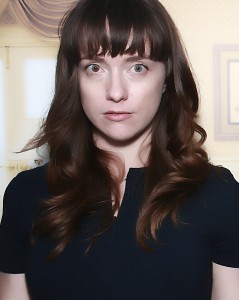 This month’s online fiction features a story by Amelia Gray, written to accompany a track on White Dresses, the latest album from Portland indy favorites, Loch Lomond. (Head on over to the story to hear the excellent song in question!) Packed into a tight 500 words, “Spray Painted Drums” thrums with all the hope, fervor, chaos, humor, invention, possibility, and lightly carried ferocity of an urban parade. We asked the author about what it was like writing to the beat of your own drummer.
This month’s online fiction features a story by Amelia Gray, written to accompany a track on White Dresses, the latest album from Portland indy favorites, Loch Lomond. (Head on over to the story to hear the excellent song in question!) Packed into a tight 500 words, “Spray Painted Drums” thrums with all the hope, fervor, chaos, humor, invention, possibility, and lightly carried ferocity of an urban parade. We asked the author about what it was like writing to the beat of your own drummer.
RM: Could you explain this collaboration with Loch Lomond and how it came about? Whose idea was it?
AG: I was contacted by my friend Frayn Masters in Portland about the collaboration – she was tasked with finding the writers and artists, as I believe it will be an illustrated book. I heard from Ritchie and Brooke of Loch Lomond but one of my ideas was to write the piece drawing straight from the lyrics without considering any additional influence. I listened to the song once or twice but carried the lyrics themselves around for a few weeks.
RM: You were obviously inspired by those lyrics, but how did your story depart from them to form its own unique world? Do you feel like you’re telling the same story or a different story than the original song?
AG: I think there are bits and scraps of the original song in my story. I was thinking about celebration and optimism and precarious value. It seems like the song is meant kind of as a love song, romantic or platonic I can’t figure.
RM: Is this the first time you’ve written to music? What is that like? Did the music itself (as opposed to just the lyrics) play in your head while you were working on this story and trickle into your writing? Did it in some way influence your tone or your rhythm?
AG: I wrote “These are the Fables” from a New Pornographers song of the same title. I found in both cases I wanted the words to stand alone. I have a pretty hard time writing to music for the most part, even songs without lyrics crawl in there and lay their eggs, and so I mostly work in silence and focus on drawing out the rhythm that’s in the text.
RM: Speaking of that rhythm, your story is about a town parade, and the endless sentences read like one long, lively, odd procession. I love the way this builds up to create an almost visual representation of your narrative. What was your thinking in creating such a crowded paragraph?
AG: This made me think about how I have another story involving a parade that’s structured in much the same way. Parades are so real, they’re so much human effort concentrated and displayed. It doesn’t make sense to me to have a parade story in mincing, short lines. Also nobody’s talking while watching a parade except to say “look at that” or similar and so dialogue seems out of place.
RM: In this piece, you’re telling a story to a song. One of my favorite kinds of songs is a narrative song–a song that tells a story. Do you have a favorite narrative song (by any artist, not necessarily Loch Lomond)?
AG: I think that Decemberists’ album The Hazards of Love is pretty great.
RM: Given the news out of Washington, with the sequester and the cut-backs and the shut-down of our government, it’s hard not to hear an echo of our current political situation in this story about a town fighting to save itself from some vague threat of bureaucratic elimination. Am I just imagining that echo?
AG: Oh sure, I think I was writing this when Wendy Davis was holding down the Texas Senate. There’s this nervous perception that one or two people are going to ultimately save us or ruin us, when we’re each of us individually responsible. I didn’t intend to write a political story but that nervousness was on my mind and I wanted to be in Austin.
RM: Loch Lomond sing of a “fine and happy day,” and their “Spray Painted Drums” ends on the refrain “you won you won you won,” but the overall tone of the song feels pretty melancholy; your story ends on a more ambiguous note, with things literally up in the air. Are you rooting for your town to make it? Do you smell victory?
AG: I’m not in the business of making predictions like that. I’m just a nice lady eating a great sandwich.
RM: (Aaaand now I want a sandwich. Thanks for that.) So, I feel like people either love parades or hate them. Which camp do you fall into?
AG: I love them. I went to the Pride parade in West Hollywood last year and had so much fun. I’ve never seen a really big one, like with balloons. Why, is there a parade out there? Can we go see?
RM: Finally, what are you working on now?
AG: A novel, slowly but slowly.